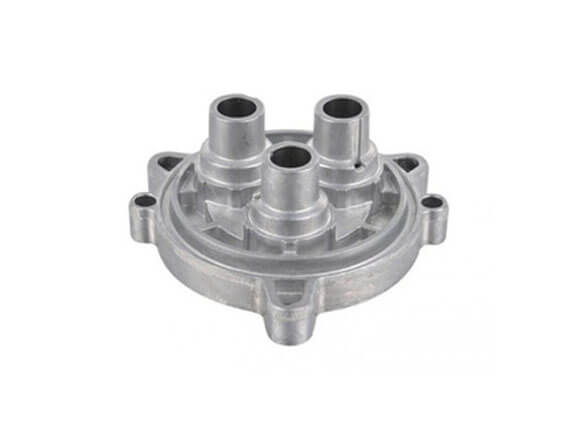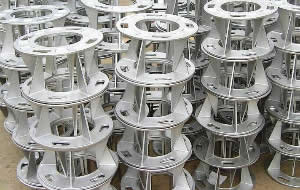How Light Weight Aluminum Foundries Add To Various Industries: A Thorough Review
Aluminum factories function as essential distributors across multiple markets, consisting of automobile, aerospace, building, and electronics. They produce components that are not just lightweight yet additionally durable, enhancing the performance of various items. With advanced casting strategies and a dedication to sustainability, these foundries are adapting to fulfill evolving market demands. As they introduce, the impact of light weight aluminum castings on various applications increases crucial inquiries regarding the future of manufacturing. What exists ahead for this vital market?
The Duty of Light Weight Aluminum Foundries in the Automotive Market
As the auto market progressively welcomes lightweight products to enhance gas performance and efficiency, light weight aluminum factories play a crucial duty in this evolution. These facilities concentrate on the manufacturing of aluminum castings, which are important elements in contemporary cars. By supplying high-strength, lightweight components, aluminum factories make it possible for manufacturers to minimize the total weight of automobiles, eventually bring about boosted gas economic climate and lowered exhausts.
Aluminum's resistance to corrosion additionally improves automobile longevity, making it an eye-catching choice for car manufacturers. Factories make use of innovative techniques such as die casting and sand spreading to develop precise and detailed elements, making certain that they fulfill rigorous industry requirements. In addition, the ability to recycle light weight aluminum effectively contributes to a more sustainable manufacturing procedure. As the vehicle field remains to innovate, aluminum factories will stay crucial in providing the materials required for the future generation of lorries, sustaining both efficiency and ecological goals.

Aerospace Applications of Light Weight Aluminum Castings
Aluminum spreadings are essential to the aerospace market, providing a combination of lightweight strength and durability that is crucial for airplane performance. These spreadings are utilized in various components, such as engine parts, architectural structures, and touchdown gear, where weight decrease is important for fuel effectiveness and overall safety and security. The convenience of aluminum permits for complex geometries that improve wind resistant performance while keeping structural stability.
Additionally, developments in casting technologies have actually improved the precision and surface coating of aluminum elements, reducing the requirement for substantial post-processing. This effectiveness not only accelerates manufacturing timelines however also reduces expenses, making light weight aluminum an attractive choice for manufacturers. The deterioration resistance of aluminum assurances durability and dependability in rough operating environments, further developing its duty in aerospace applications. As the market develops, aluminum spreadings remain to be an essential material, driving innovation and supporting the growth of next-generation airplane.
Construction Market Developments With Aluminum
The building and construction market has increasingly taken on light weight aluminum due to its light-weight residential or commercial properties and flexibility, paralleling its effective applications in aerospace. Developments in light weight aluminum layout have brought about more powerful, much more reliable frameworks, making it possible for home builders and architects to discover new possibilities. The material's resistance to corrosion and reduced upkeep needs make it specifically appealing for both industrial and residential jobs.
Aluminum's flexibility promotes the production of intricate designs, permitting for visual improvements that were previously tough with typical materials. Prefabrication methods have also evolved, utilizing light weight aluminum to lower building time and expenses considerably. Furthermore, the energy efficiency of aluminum systems-- such as home window frameworks and roofing-- contributes to lasting structure practices, aligning with modern environmental requirements. As the building market proceeds to embrace these advancements, aluminum's function is expected to increase, driving additional advancement and contributing to the growth of resistant facilities.
Electronic devices and the Demand for Lightweight Aluminum Components
With the quick improvement of modern technology, the demand for lightweight light weight aluminum components in the electronics sector has surged. As devices end up being much more small and mobile, producers seek products that supply both toughness and weight reduction. Light weight aluminum, with its exceptional strength-to-weight proportion, has actually become a preferred selection for components such as housings, heat sinks, and structural assistances.
The use of aluminum not only improves product efficiency but additionally contributes to power performance, as lighter tools call for much less power throughout procedure. Additionally, light weight aluminum's superb conductivity makes it suitable for digital applications, guaranteeing reliable warmth dissipation and reducing the danger of getting too hot.
As customer preferences change in the direction of streamlined and lightweight devices, light weight aluminum shops play an essential role in meeting the developing demands of the electronics industry (Aluminum Foundry). Their capability to generate high-quality and accurate light weight aluminum components sustains innovation, allowing producers to push the borders of layout and performance
Sustainable Practices in Light Weight Aluminum Foundries
As the electronics industry progressively focuses on sustainability, light weight aluminum shops are adapting their practices to straighten with these environmental goals. Many shops are carrying out recycling programs that recover light weight aluminum scrap, considerably minimizing the demand for basic materials and lessening waste. By making use of energy-efficient technologies, these centers are reducing their carbon impact; for circumstances, using electrical heating systems as opposed to standard gas-fired ones can bring about significant power cost savings.
Additionally, aluminum factories are buying water conservation measures, such as closed-loop systems that reuse water used in cooling down procedures. These practices not just reduced water intake however additionally alleviate the environmental impact associated with wastewater discharge. Additionally, many factories are exploring sustainable power sources, such as solar and wind power, to fulfill their energy needs sustainably. With these efforts, light weight aluminum foundries exemplify a dedication to environmental stewardship while remaining to meet the demands of the electronics sector.
Future Fads in Light Weight Aluminum Foundry Technologies
Arising innovations are poised to transform aluminum foundries, boosting performance and item top quality while advancing sustainability initiatives. Advancements such as expert system and device discovering are anticipated to maximize production processes by anticipating equipment failures and improving resource appropriation. The combination of sophisticated robotics will certainly simplify procedures, decreasing labor costs and minimizing human error.
Additive manufacturing, or 3D printing, is also gaining grip, making it possible for the manufacturing of complicated geometries that were formerly unattainable i loved this with traditional techniques. This change might bring about significant material cost savings and decreased waste. Furthermore, clever shops using navigate to these guys IoT (Net of Things) technologies will allow real-time surveillance and data evaluation, promoting proactive decision-making.
Finally, the fostering of cleaner melting modern technologies and recycling methods will further lower the environmental footprint of aluminum factories, making them much more sustainable. Jointly, these fads indicate a future where light weight aluminum factories can run with better performance and responsibility.
Often Asked Inquiries
What Are the Environmental Influences of Aluminum Foundries?

Just How Do Foundries Guarantee Quality Assurance in Aluminum Spreading?
Factories ensure quality control in light weight aluminum casting by executing strenuous evaluation processes, using innovative technology, performing regular product testing, and sticking to industry standards, consequently preserving uniformity and integrity in their completed products. aluminum casting.
What Is the Average Life-span of Light Weight Aluminum Cast Components?
The average life-span of aluminum cast parts typically varies from 10 to 50 years, depending on factors such as environmental problems, use, and maintenance. Proper treatment can considerably improve their durability and performance with time.
How Are Aluminum Alloys Selected for Certain Applications?
Aluminum alloys are picked based upon variables such as strength, corrosion resistance, weight, and thermal conductivity. Engineers evaluate the specific requirements of applications to determine the most ideal alloy for best performance and durability.
What Are the Safety And Security Rules for Light Weight Aluminum Factory Workers?
Security laws for light weight aluminum foundry workers consist of personal protective tools mandates, air flow requirements, exposure restrictions to harmful materials, and procedures for managing liquified steel. Compliance assurances worker safety and decreases wellness risks connected with shop procedures.
As the vehicle sector increasingly embraces lightweight materials to boost fuel efficiency and efficiency, light weight aluminum foundries play an important function in this evolution. As consumer preferences change towards light-weight and sleek gizmos, light weight aluminum factories play a necessary function in fulfilling the evolving needs of the electronic devices industry. As the electronics sector significantly prioritizes sustainability, aluminum factories are adjusting their practices to straighten you can try here with these environmental objectives. Numerous shops are implementing recycling programs that redeem aluminum scrap, greatly reducing the requirement for raw materials and lessening waste. Safety and security laws for light weight aluminum factory employees consist of personal protective devices requireds, air flow requirements, direct exposure limitations to hazardous materials, and methods for managing liquified steel.